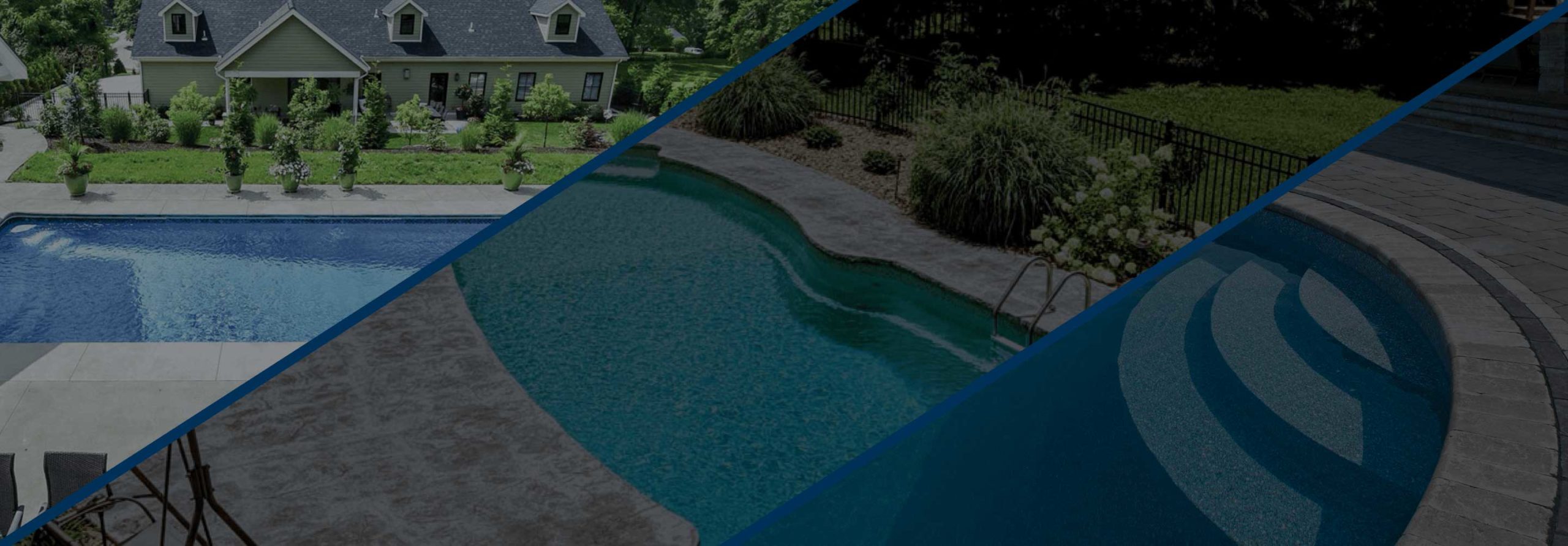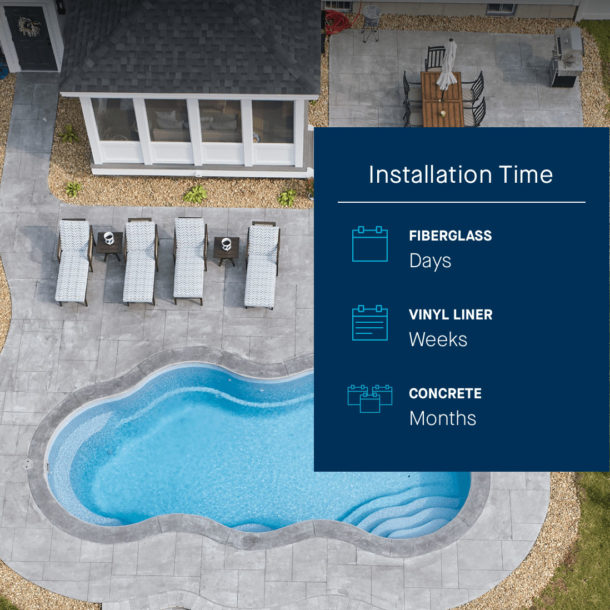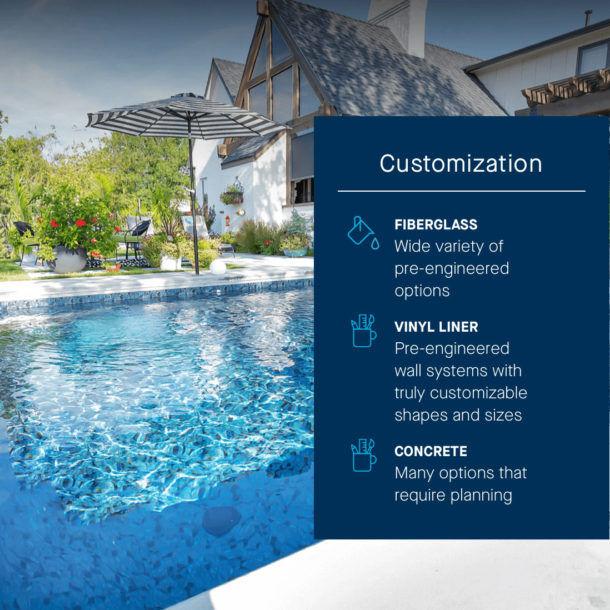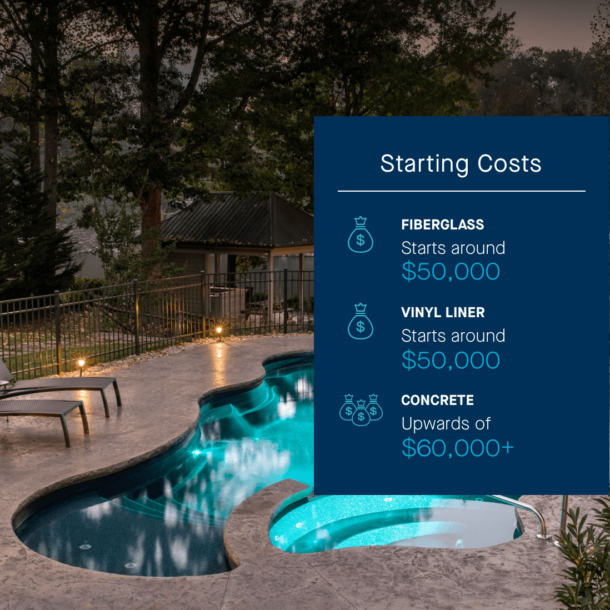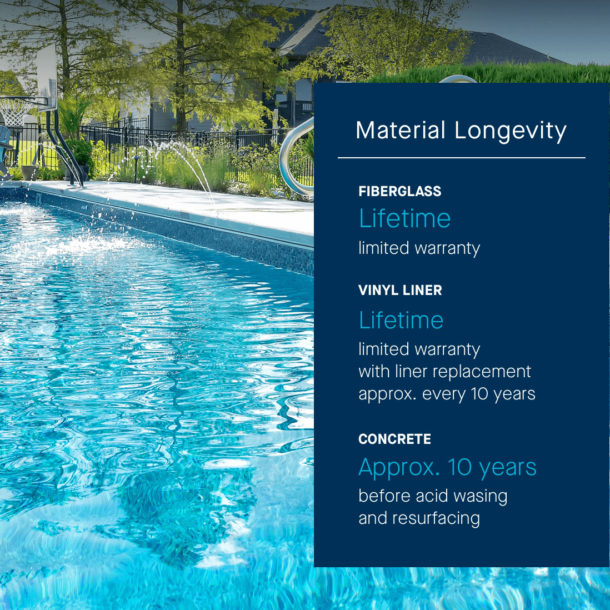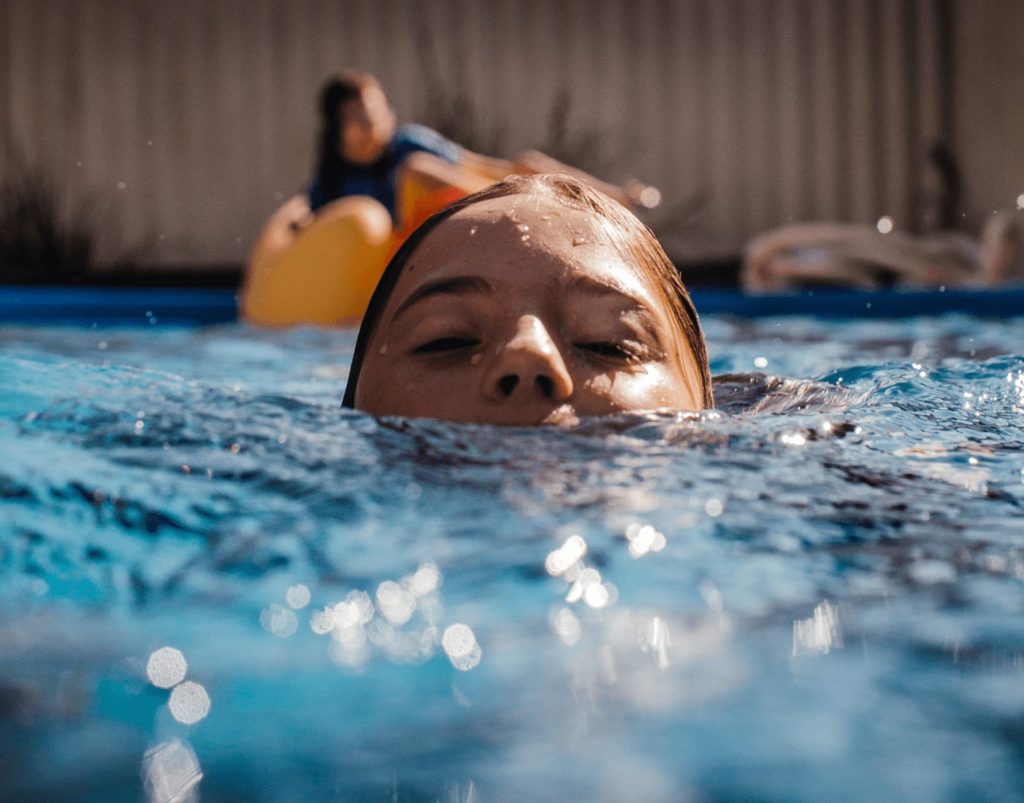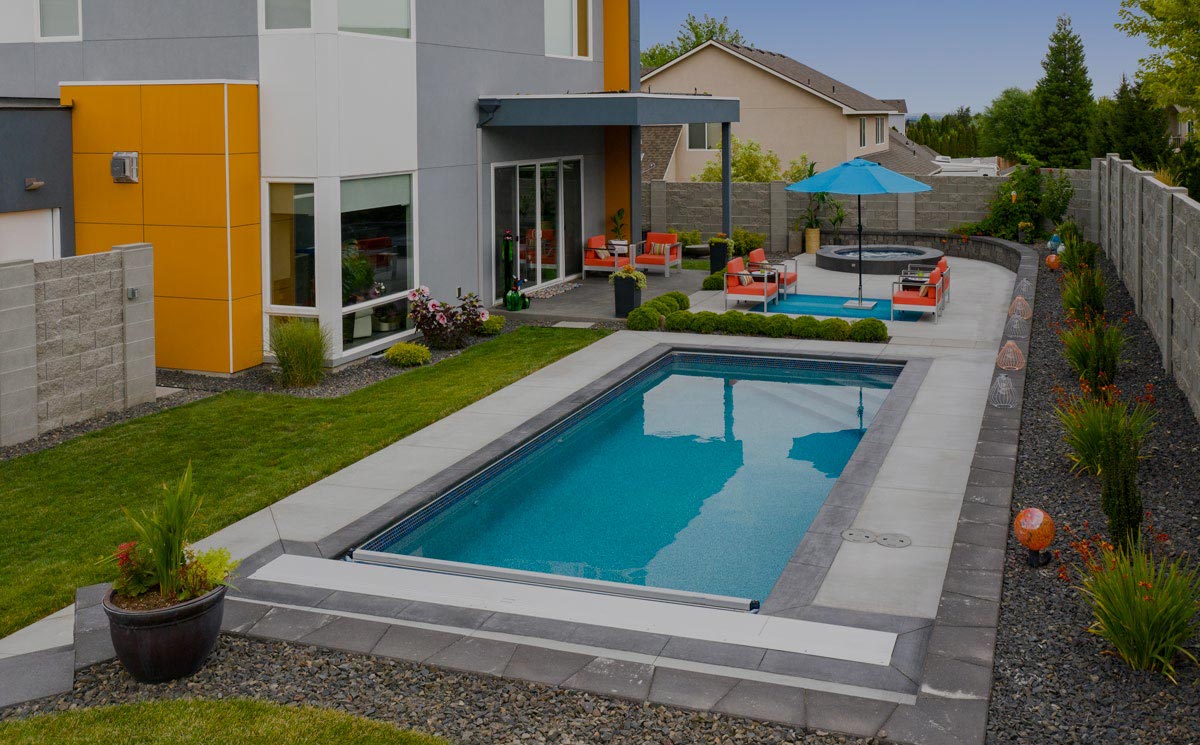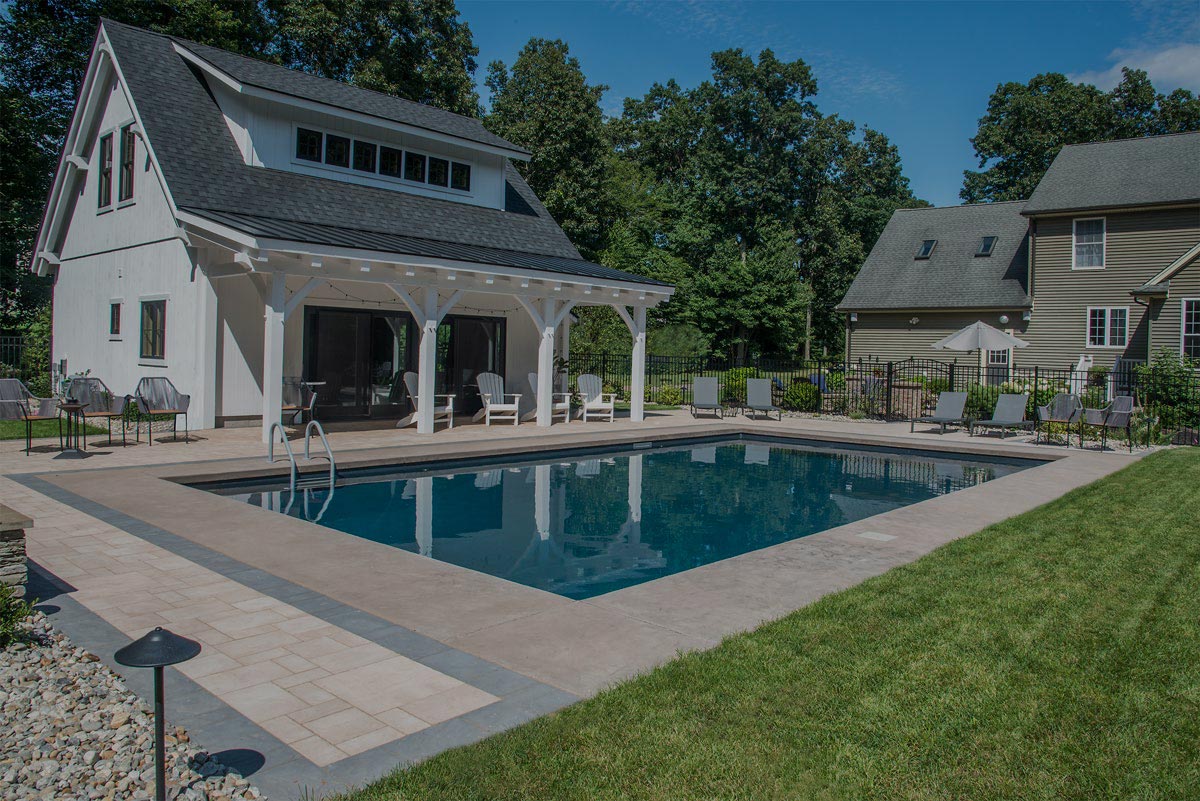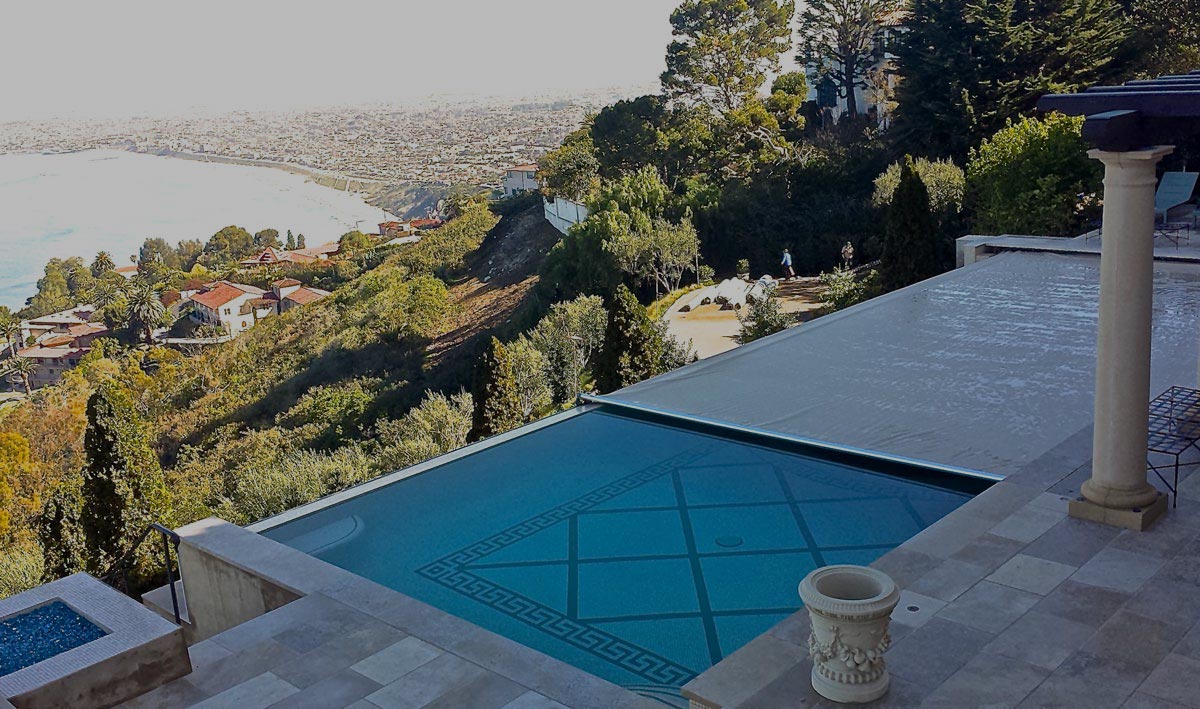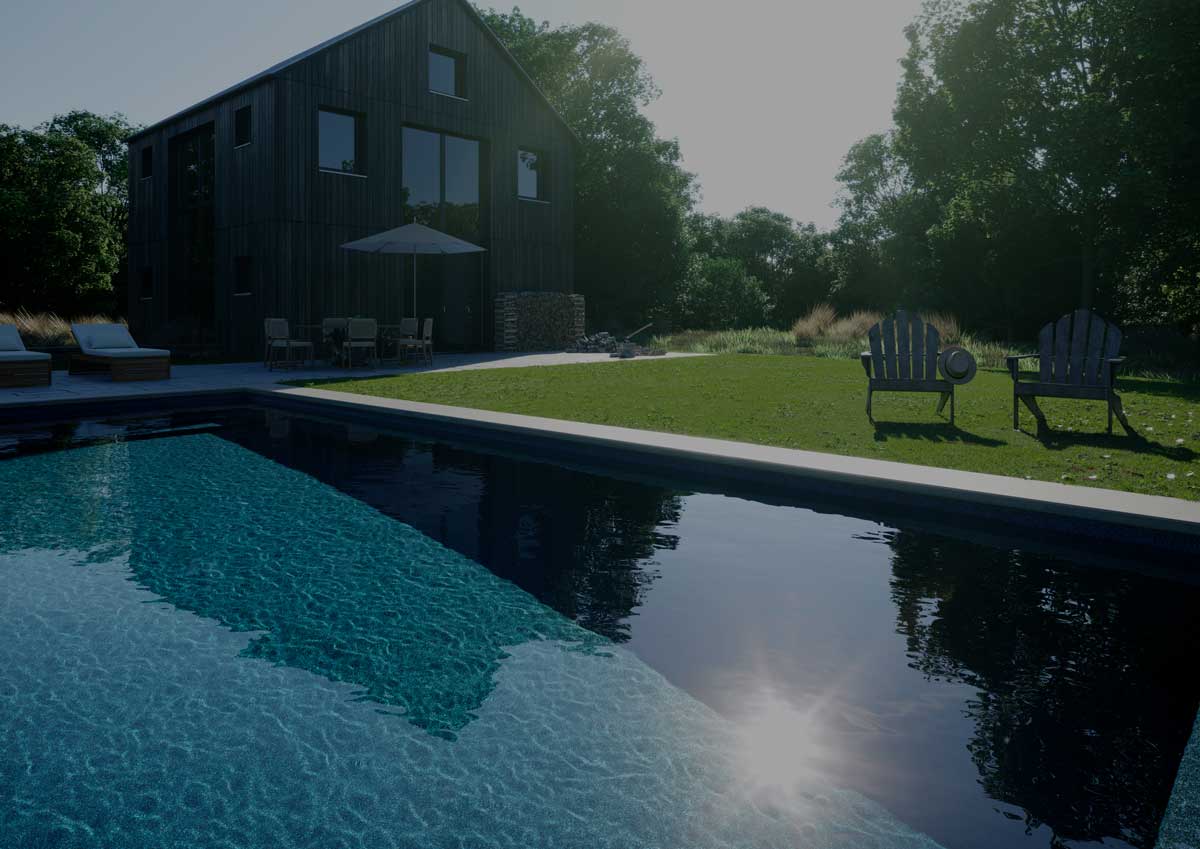Jump to the Pros & Cons: Comparison Overview | Fiberglass Advantages | Vinyl Liner Advantages | Side-by-Side Comparison
What Is The Best Type of Inground Swimming Pool for You?
Ultimately, the best type of inground swimming pool is the one that lets you get the most enjoyment out of your backyard. Planning your dream pool and picking pool materials is an initial step to set you up for a lifetime of fun and memories. To help you choose the best type of swimming pool for you, we’ll look at factors like installation time, style and customization, pool cost, durability and maintenance needs to help you understand the differences between Latham fiberglass and vinyl liner pools vs. concrete (also referred to as gunite or shotcrete) pools.
Advantages of Fiberglass Pools
Fiberglass pools have a number of advantages when comparing them vs. concrete pools or vinyl liner pools.
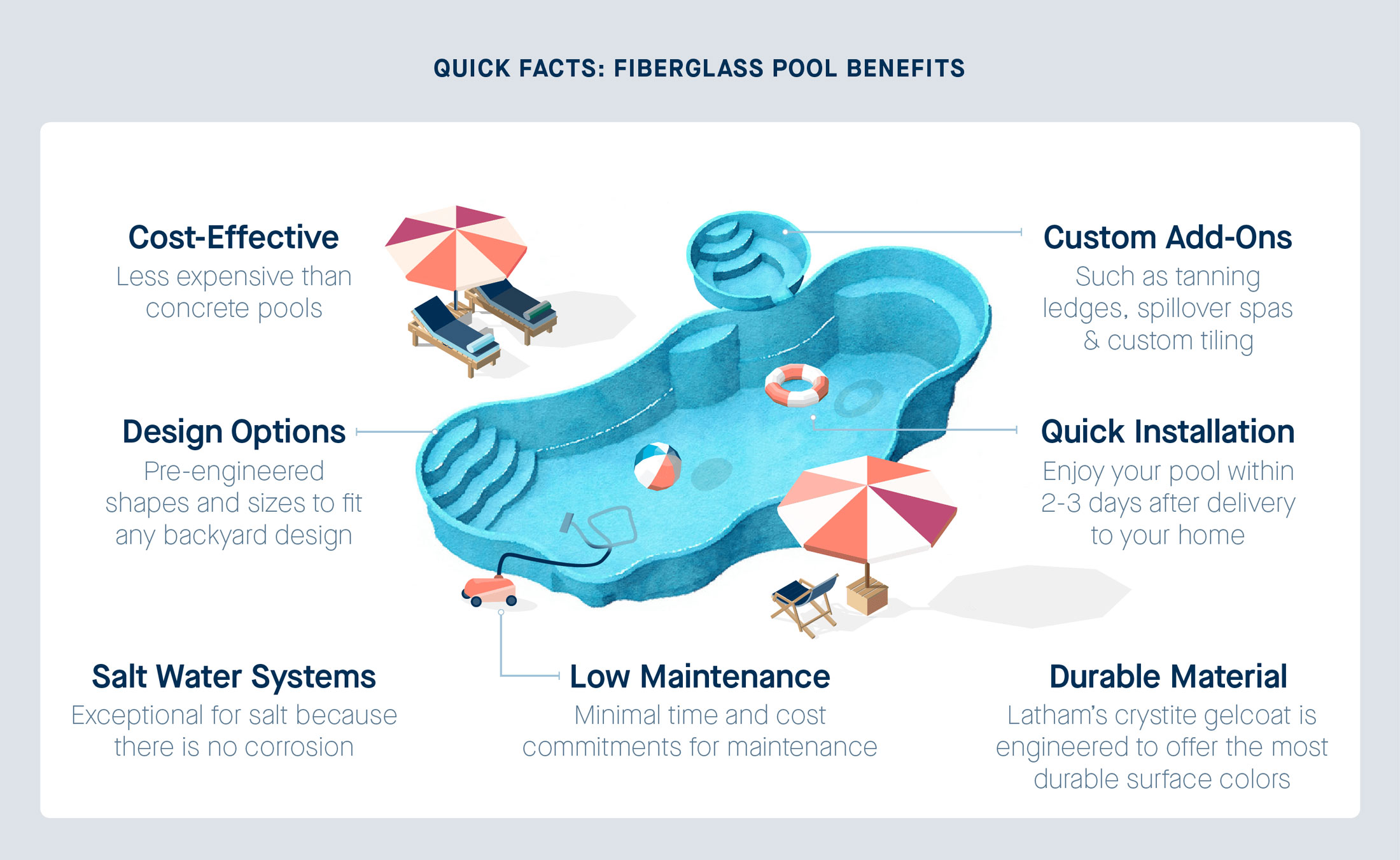
Fiberglass pools are highly durable and very efficient to install. Because they’re pre-engineered, the entire installation process can be completed quickly. Once your fiberglass pool is delivered to your home, you can start enjoying your new pool in as little as three days.
When comparing fiberglass pools vs concrete (gunite) pools can take approximately three to six months to install. Fiberglass is factory-made while concrete pools need to be poured on-site, which can not only increase time to complete, but keep your yard in disarray for a much longer period of time. One of the most time consuming parts of the concrete process is that it requires between 28 to 30 days for the material to cure.
Fiberglass offers homeowners a wide variety of pre-engineered options that are perfect for any backyard need or aesthetic, including:
- Customizable Add-Ons: Can add features to customize, including tanning ledges, bubblers, LED lights and inlaid tiles.
- Sizes: Available in a wide variety of pre-engineered sizes, comparable to options for vinyl liner pools:
- Small pools: 12 x 25 feet
- Medium pools: 14 x 30 feet
- Large pools: 16 x 35 feet
- Shape Options: Available in a variety of shapes, including:
- Rectangular
- Kidney-shaped
- Free form
- Salt Water Compatible: Fiberglass pools are exceptional for salt water systems because there is no corrosion. In comparison, the porosity of concrete pools makes them ill-suited for salt water systems.
The initial cost of a fiberglass pool can typically start at $50,000, making them potentially less expensive than an installed gunite concrete pool, which averages upwards of $60,000. We get into more detail on pricing including installation factors and maintenance costs in our fiberglass pool pricing guide.
Latham is the industry leader in innovation across its fiberglass pools with technically superior shells and finishes that are built to last. Sturdy, factory-controlled quality of construction make fiberglass pools exceptionally durable, especially when compared to concrete.
- Durable: Fiberglass pools can last the lifetime of the home it’s installed in. To put things in perspective, there are fiberglass pools still in the ground that were put in during the 60’s! Latham’s carbon-infused technologies have superior compressive strength and an eight-element building process that provides industry-leading thickness and durability.
- Low-Maintenance: Minimal time commitment for maintenance. Latham’s crystite gelcoat is engineered and built for fade, offering the most durable surface colors. The smooth, durable finish also makes fiberglass easier to clean and control algae growth.
- Low Cost-of-Maintenance: No costly upkeep expenses, such as the acid washing and resurfacing needed to maintain concrete pools. Fiberglass pools also require 30% less chlorine than other pool types to keep clean. In comparison, the 10-year maintenance cost of a concrete pool ranges between $15,000 to $27,000—more expensive than both fiberglass and vinyl liner pools.
- Warranty: Latham fiberglass pools are backed by some of the best warranties in the pool industry. When you buy from an established pool
Advantages of Vinyl Liner Pools
From virtually endless customization options to affordability, vinyl liner pools have a number of advantages.
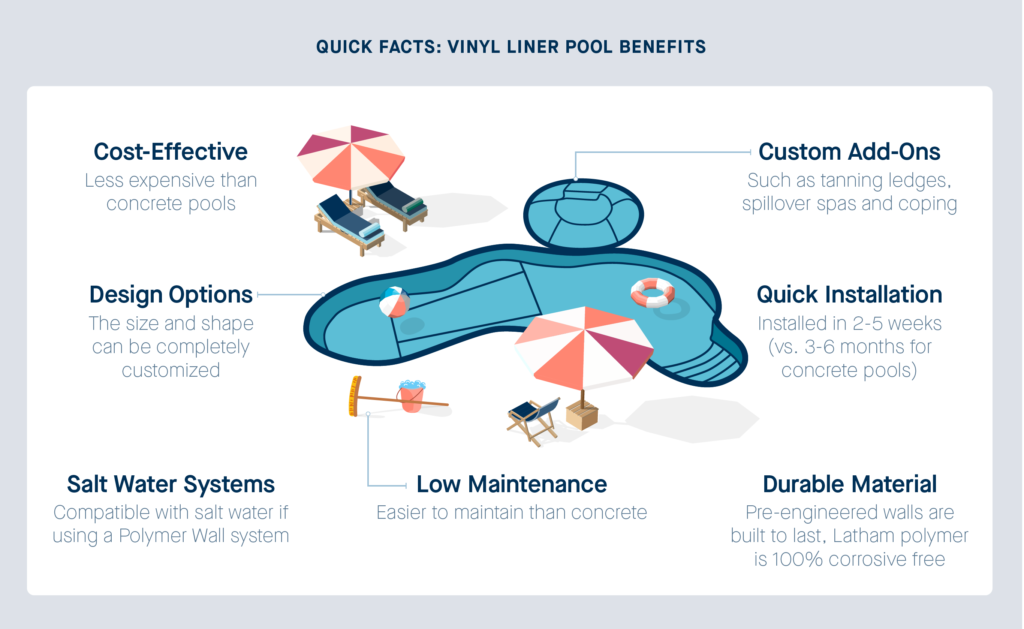
When it comes to installation time, vinyl liner pools take a close second to fiberglass. While they may take up to a few more weeks to build and install, you can still have a ready-to-use pool in a matter of weeks vs. the arduous months-long process required for concrete pools.
Sturdy, factory-controlled parts are pre-engineered and designed to fit together. Pre-engineered construction makes vinyl liner pools faster to install than concrete pools, which need to be poured directly on-site and require time to cure before they can be filled and enjoyed. This means you have more time to enjoy your vinyl liner pool once it’s been installed!
In terms of size and shape, inground vinyl liner pools give homeowners plenty of options to choose from. From more traditional rectangular shapes, to intriguing curved free-form shapes like the Taormina or Mountain Lake II models, vinyl liner pools come in a variety of styles.
Vinyl liner pools are highly customizable and offer homeowners an abundance of options to choose from to create the pool of their dreams. Vinyl liners are also soft to the touch and a more comfortable option than the rough texture of a concrete pool.
- Customizable Style: Vinyl liners come in a variety of colors and patterns, from solid hues to prints that mimic the look of an elaborate mosaic, tile or seaglass. Replacing your vinyl liner can give your pool an entirely new and refreshed look.
- Customizable Add-Ons: You can also choose to enhance your vinyl liner pools with a number of add-ons, including tanning ledges and coping and decking.
- Sizes: Available in a wide variety of sizes and dimensions, comparable to prefab sizes for fiberglass pools, including:
- 14 x 28 feet
- 16 x 32 feet
- 16 x 36 feet
- 18 x 36 feet
- 20 x 40 feet
- Shape Options: Available in a variety of shapes, including:
- Rectangular
- Kidney-shaped
- L-Shaped
- Free form
- Salt Water Compatible: Works well with salt water systems and polymer wall systems.
The average initial cost of an inground vinyl liner pool can start around $50,000. Vinyl liner pools are less expensive than concrete pools in terms of initial cost, with concrete installation costs starting around $60,000.
However, the total cost of your pool can depend on a number of factors, including its size, add-ons and level of customization.
All Latham branded liners are backed by our standard industry leading 20 year limited warranty and only use the finest raw materials available. The longevity of a vinyl liner, especially when it comes to the cosmetic appearance, almost always is dependent on maintaining proper water chemistry. Therefore, for best results we recommend working with your local pool builder and testing water on regular basis.
- Relatively Low-Maintenance: Vinyl liner pools are easy to maintain, but require regular scrubbing with a soft brush or sponge to keep dirt and debris at bay. Concrete pools, in comparison, require an intensive degree of care (including periodic acid washing and resurfacing) as these pools are more susceptible to algae growth due to their porous nature.
- Durable: Vinyl Liner pools wall systems can last a lifetime with routine liner changes. In comparison, a well-maintained concrete or gunite pool can last for decades, but needs to be routinely resurfaced and acid washed approximately every 10 years.
Analyzing Concrete Pools (Gunite Pools)
Concrete pools are sometimes referred to as gunite pools. While their ability to be highly customized is one of the most attractive features of a gunite pool, they can take longer to install. Although both offer a lot of design flexibility and customization options, one of the main differences between gunite and fiberglass is that fiberglass pools are manufactured offsite while gunite pools are made-to-order and the process – from digging to pouring your pool – happens entirely in your backyard.
A fiberglass pool is made of prefabricated components, which are then delivered and installed on your property. While your fiberglass pool is being manufactured, your building team can concurrently begin breaking ground and getting ready for your pool to be delivered and installed. Installing a fiberglass pool can take as little as two to three days.
By contrast, a gunite pool needs to be done in stages, with your pool installation team digging and preparing the ground, then adding concrete to the space. It can take roughly 28 to 30 days for a gunite pool to cure before it can be filled and used. From end-to-end, the entire installation process for a gunite pool can take anywhere from three to six months.
When comparing a gunite pool vs a liner pool, a vinyl liner pool may take slightly longer to install than fiberglass. However, you’re looking at a timetable of roughly two to five weeks for a vinyl pool to be completed compared to the multi-month process required for proper installation of a gunite pool.
Concrete or gunite pools offer a range of customization options since their size and shape can be tailored to fit your design aesthetic, as well as conform to the size of your backyard. Due to their highly customizable nature and the labor involved, concrete pools are often the most expensive of pool types, starting at $50,000 and climbing higher depending on the degree of customization.
Some of the most common shapes, sizes, and custom add-ons for gunite pools include:
- Customizable Add-Ons: Common add-ons for a gunite pool include tanning ledges, decking, lighting, or water features.
- Sizes: Gunite pools can have custom sizes to fit any size backyard. However, some of the most commonly requested dimensions are:
- 10 x 20 feet
- 12 x 25 feet
- 14 x 28 feet
- 14 x 30 feet
- 15 x 30 feet
- 16 x 32 feet
- 16 x 36 feet
- 16 x 35 feet
- 18 x 36 feet
- 20 x 40 feet
- Shape Options: Gunite pools are available in a variety of shapes, including:
- Rectangular or linear
- Freeform
- Kidney-shaped
- L-shaped
- Not Salt Water Compatible: Gunite pools are not suited for use with salt water systems. Salt water can be corrosive to the finish of your pool and impact its longevity. If you have your heart set on a salt water system, fiberglass or vinyl liner pools are a safer bet.
Concrete pools can last a long time, but can be more expensive than a fiberglass or vinyl liner pool to maintain.
- Durable: Concrete pools have an average lifetime of roughly 30 years or more, if they are well-maintained. However, they do need to be resurfaced roughly every 10 years.
- Higher cost of maintenance: Resurfacing and maintenance of a concrete pool can be more expensive compared to the upkeep required of a vinyl liner or fiberglass pool. On average, the 10-year maintenance cost for a gunite pool can run between $15,000 and $27,000. This is substantially higher compared to the $7,000 10-year maintenance cost for a vinyl liner pool and $4,000 investment to maintain a fiberglass pool over a decade.
- More frequent maintenance: Concrete pools require regular upkeep, including weekly scrubbings and sweepings to keep algae at bay due to its more porous surface.
Concrete cancer, also known as alkali-silica reaction (ASR), is a real risk with concrete pools.
When concrete is exposed to moisture, chemicals or other factors, it can develop a chemical reaction known as alkali-silica reaction (ASR), in which the concrete expands and cracks. This reaction starts in one place, then spreads across the entire concrete structure over time, breaking down the strength and integrity of the concrete.
Pools, which are filled with water and chemicals continuously, are especially susceptible to concrete cancer, which would require a complete replacement of your pool structure.
Since fiberglass and vinyl liner pools use no concrete in their structures, this expensive replacement is only needed for concrete pools.
Fiberglass, Vinyl Liner and Concrete Pool Takeaways: Which Is Better For You?
A pool can give you many years of enjoyment from the comfort of your own backyard. Choosing the type of pool that’s best for you depends on what matters most to you with your backyard pool experience. Comparing the pros and cons can help you find the best pool material to increase the recreation—and relaxation—you’ll get from your pool in the long run.
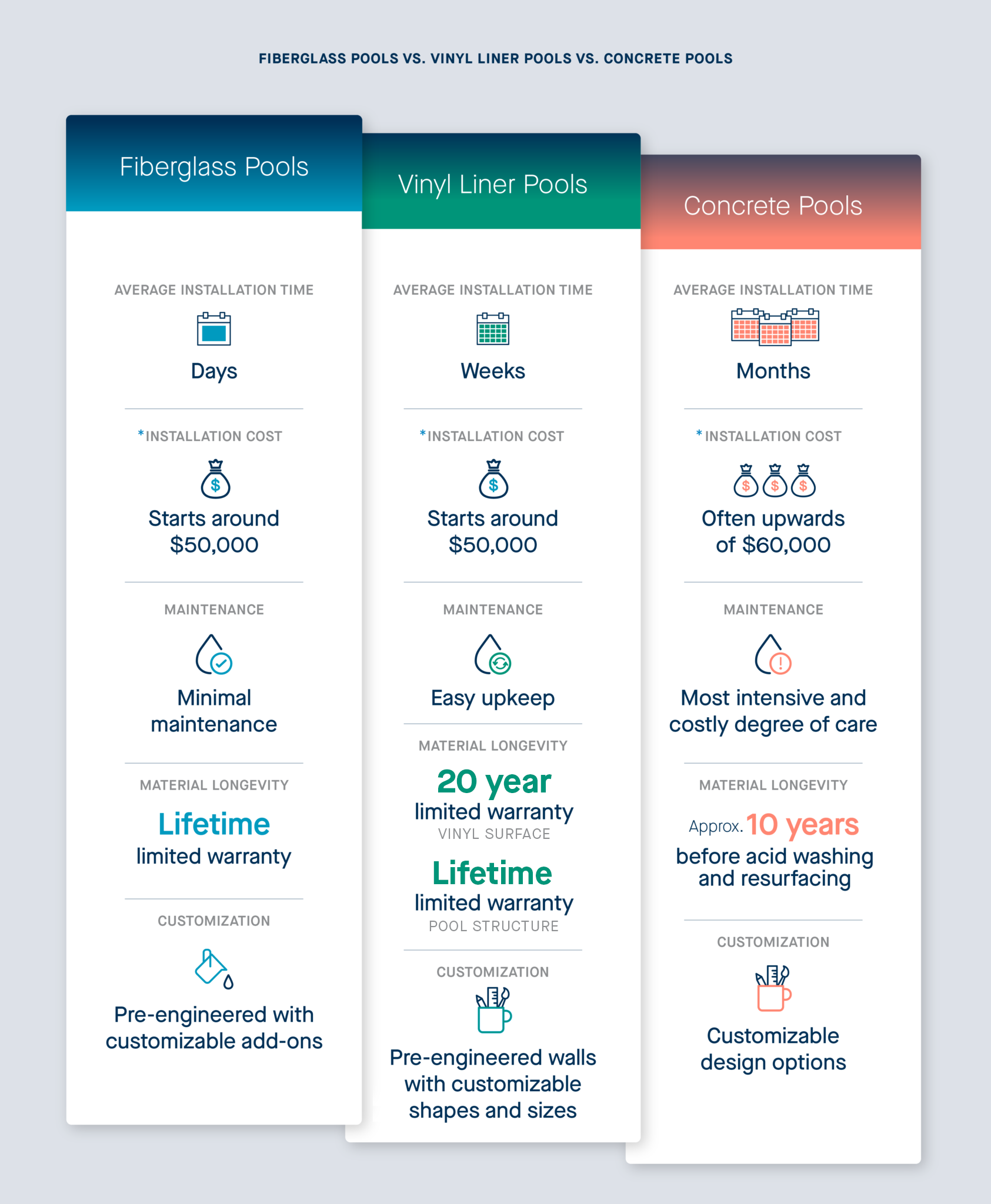
*Installation costs based on national average selling and installation pricing. Actual costs depend on various factors, including location of service, pool model and options selected. Please consult with a Latham Independent Builder for a customized estimate.
Find Your Dream Pool
Now that you understand a little more about the pros and cons of each pool type, you’ll be better prepared to make a decision that’s right for you.
Start shopping for your fiberglass or vinyl liner pool with Latham. Get in touch with our team of friendly, knowledgeable experts who can help you determine which options are the best for your tastes, budget and lifestyle.

